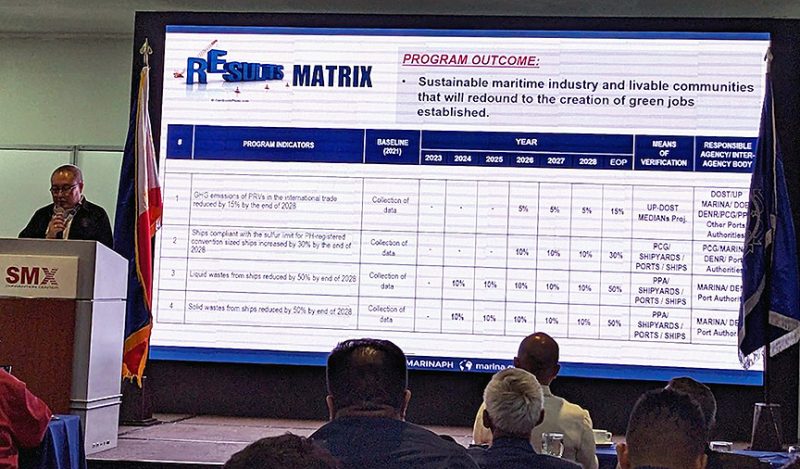-
The Maritime Industry Authority targets significant reduction in greenhouse gas emissions of and wastes from Philippine-registered ships by 2028
-
By end-2028, a 15% reduction in GHG emissions of Philippine-registered ships in the international trade is projected
-
Also eyed is a 30% improvement in the number of Philippine-registered convention ships compliant with the International Maritime Organization fuel oil sulfur limit by end-2028
-
A 50% reduction in solid and liquid wastes from ships targeted as well
-
MARINA recently created the Marine Environment Protection Development Service to focus on the development of standards and on marine environment protection programs
The Maritime Industry Authority (MARINA) is eyeing significant cuts in the greenhouse gas (GHG) emissions of and wastes from Philippine-registered ships by 2028, an agency official said.
At the same time, the agency seeks to create policies implementing various International Maritime Organization (IMO) Conventions to promote an environmentally sustainable maritime industry.
From 2026 to 2028, MARINA aims to reduce GHG emissions of Philippine-registered vessels in the international trade by 5% each year or up to 15% by end of 2028, according to MARINA Shipyard Regulations Service and Marine Environment Protection Development Service (MEDPS) director Engineer Ramon Hernandez during a presentation at the Blue Economy Annual Trade & Conference 2023 on September 6. The baseline will be data collected from 2021.
The 2028 target for the number of Philippine-registered convention ships compliant with the IMO fuel oil sulfur limit is 30%, or 10% per year from 2026.
For solid and liquid wastes from ships, the goal is to slash these by 10% each year from 2024 to 2028, or by a total of 50% by end of 2028.
The targets are part of deliverables under one of the overriding programs of MARINA’s updated Maritime Industry Development Plan (MIDP) 2028.
MIDP 2028 is a decade-long roadmap aimed at accelerating the development of a nationally integrated and globally competitive Philippine maritime industry. The updated version of the MIDP, launched last February, features three overriding programs, four core programs, and one enabling program. The goals and outcomes of each program are interrelated.
Overriding program 2—promotion of environmentally sustainable maritime industry—aims to accelerate the implementation of environmental regulations and standards to prevent pollution from shipping activities, transfer and spread of invasive aquatic species, and reduce GHG emissions from ships, thereby reducing negative impacts on the marine environment. It aims to establish a sustainable maritime industry and livable communities that will redound to the creation of green jobs.
Hernandez said MARINA recently created the MEDPS to focus on the development of standards and on projects and programs on marine environment protection. The creation of MEDPS is also part of the strategies under overriding program 2.
Overriding program 2 has four components: implementation of a marine environment protection policy framework; enhancement of system and infrastructure; promotion, development and implementation of a strategy for a green maritime Philippines; and strengthen research and development.
The implementation of a marine environment protection policy framework involves ratification and full implementation of relevant environment protection conventions. Its strategic deliverables include the following:
- From 2024 to 2025—National policy on the implementation of the International Convention for the Prevention of Pollution from Ships (MARPOL) 1973, as modified by Protocol of 1978
- From 2024 to 2027—Implementation of Ship Energy Efficiency Measures for Philippine-registered ships
- 2024—Ratification of the International Convention on Civil Liability for Oil Pollution Damage
- 2024—Ratification of the Hong Kong International Convention for the Safe and Environmentally Sound Recycling of Ships (Hong Kong Convention)
- 2025—National policies on the International Convention for the Control and Management of Ships’ Ballast Water and Sediments (BWM Convention 2004 and International Convention on the Control of Harmful Anti-fouling Systems in Ships (AFS Convention)
- 2025—Enactment on the prevention and control of pollution from ships and to provide penalties and for other purposes
- 2025—Fishing gear marking policy including detection of lost fishing gear at sea project with Bureau of Fisheries and Aquatic Resources
- 2026—National policy on the Hong Kong Convention
- 2026—National policy on the Convention on the Prevention of Marine Pollution by Dumping of Wastes and Other Matter (London Convention), 1972, as amended and its 1996 Protocol
- 2027—Enactment on the London Convention
- 2028—Formulation of national policies on International Convention on Oil Pollution Preparedness, Response and Cooperation, International Convention on the Establishment of an International Fund for Compensation for Oil Pollution Damage, and International Convention on Civil Liability for Oil Pollution Damage
In a separate interview with PortCalls at the sidelines of the conference, Hernandez said MARINA has already included in its proposed 2024 general appropriation the budget for some of the programs under overriding program 2.
The agency will also develop an integrated marine environment protection information system, and conduct awareness programs for stakeholders.
Acknowledging that transitioning to “green” shipping may be costly for ship owners, Hernandez said they will push for incentives for shipping companies that would modernize their ships and make them environmentally friendly. Part of the strategies include incentivizing recycling activities on ships and creating a business model for retrofitting of ships transitioning to green shipping. – Roumina Pablo
RELATED READ: PH-registered ships must comply with 0.50% sulfur cap by Jan 2025









